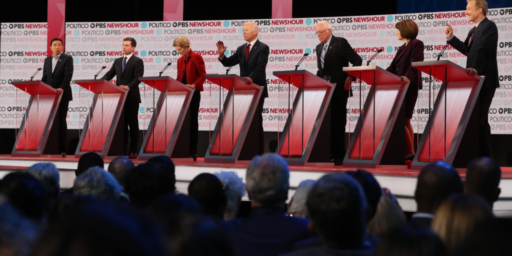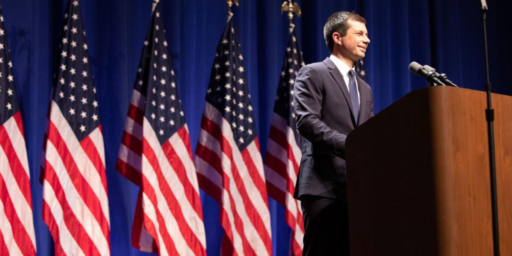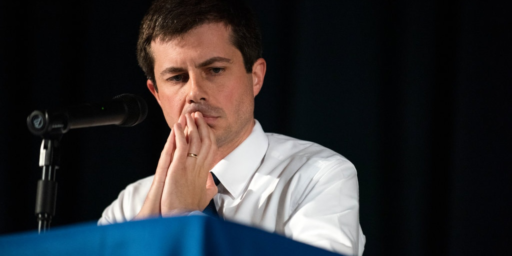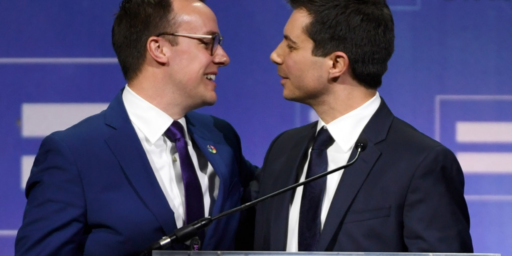Jimmy Carter’s Rennaissance?
Some 2020 Democratic hopefuls are turning to a surprising source for counsel.

The 39th President was a rare one-termer long better known for his post-presidential good works than his accomplishments in office. That may be starting to change. AP’s Bill Barrow:
Jimmy Carter carved an unlikely path to the White House in 1976 and endured humbling defeat after one term. Now, six administrations later, the longest-living chief executive in American history is re-emerging from political obscurity at age 94 to win over his fellow Democrats once again.
A peanut farmer turned politician then worldwide humanitarian, Carter is taking on a special role as several Democratic candidates look to his family-run campaign after the Watergate scandal as the road map for toppling President Donald Trump in 2020.
— “Jimmy Carter finds a renaissance in 2020 Democratic scramble“
Carter’s would be an odd map to follow, in that he only narrowly beat an unpopular, unelected Republican in the wake of the Watergate scandal. And was arguably more conservative than said Republican.
“Jimmy Carter is a decent, well-meaning person, someone who people are talking about again given the time that we are in,” Minnesota Sen. Amy Klobuchar said in an interview. “He won because he worked so hard, and he had a message of truth and honesty. I think about him all the time.”
Now, Carter’s character and decency would indeed be a wonderful example to follow.
Klobuchar is one of at least three presidential hopefuls who’ve ventured to the tiny town of Plains, Georgia, to meet with Carter and his wife, Rosalynn, who is 91. New Jersey Sen. Cory Booker and Mayor Pete Buttigieg of South Bend, Indiana, also have visited with the Carters and attended the former president’s Sunday School lesson in Plains.
Carter had planned to teach at Maranatha Baptist Church again Sunday, but he is still recuperating at home days after hip replacement surgery following a fall as he was preparing for a turkey hunt.
“An extraordinary person,” Buttigieg told reporters after meeting Carter. “A guiding light and inspiration,” Booker said in a statement. Klobuchar has attended Carter’s church lesson, as well, and says she emails with him occasionally. “He signs them ‘JC,'” she said with a laugh.
It’s quite a turnabout for a man who largely receded from party politics after his presidency, often without being missed by his party’s leaders in Washington, where he was an outsider even as a White House resident.
To be sure, more 2020 candidates have quietly sought counsel from Trump’s predecessor, Barack Obama. Several have talked with Bill Clinton, who left office in 2001. But those huddles have been more hush-hush, disclosed through aides dishing anonymously. Sessions with Carter, on the other hand, are trumpeted on social media and discussed freely, suggesting an appeal that Obama and Clinton may not have.Unlike Clinton, impeached after an affair with a White House intern, Carter has no #MeToo demerits; he and Rosalynn, married since the end of World War II, didn’t even like to dance with other people at state dinners. And unlike Obama, popular among Democrats but polarizing for conservatives and GOP-leaning independents, Carter is difficult to define by current political fault lines.
He’s an outspoken evangelical Christian who criticizes Trump’s serial falsehoods, yet praises Trump for attempting a relationship with North Korean leader Kim Jong Un. Carter touts his own personal relationship with Russian President Vladimir Putin, another Trump favorite. “I have his email address,” Carter said in September.For years, Carter has irked the foreign policy establishment with forthright criticism of Israel and its treatment of Palestinians.
He confirms that he voted for Vermont Sen. Bernie Sanders, a democratic socialist, over Hillary Clinton in Georgia’s 2016 presidential primary. In 2017, Carter welcomed Sanders, who’s running again this year, to the Carter Center for a program in which the two men lambasted money in politics. Carter called the United States “an oligarchy.”
Yet Carter has since warned Democrats against “too liberal a program,” lest they ensure Trump’s re-election.
Klobuchar credited Carter with being “ahead of his time” on several issues, including the environment and climate change (he put solar panels on the White House), health care (a major step toward universal coverage failed mostly because party liberals thought it didn’t go far enough) and government streamlining (an effort that angered some Democrats at the time). But she also alluded to how his presidency ended: a landslide loss after gas lines, inflation-then-unemployment, and a 14-month-long hostage crisis in Iran. “Their administration was not perfect,” she said.
Indeed. In fairness, though, Carter inherited a lousy economy. We endured gas lines under Richard Nixon during the first OPEC embargo and then runaway stagflation under Gerald Ford. Among other things, Carter campaigned in 1976 citing Arthur Okun’s “Misery Index”—obtained by adding together the inflation and unemployment rates. It was 17.01 at the end of Nixon’s term and still 12.66 by the time Carter took office. Alas, it was up to 19.72 at the end of Carter’s single term.
The hostage crisis, and especially the sense that Carter’s response was tepid and undercut American national pride, was certainly a big contributor to Reagan’s win in 1980. But it’s far enough into the past that those under 50—maybe even under 60—weren’t shaped by it.
Carter is enough of an enigma that he is the only living president not to draw Trump’s ire or mockery, even if Republicans have caricatured Carter for decades as a failure. Trump and Carter chatted by phone this spring after Carter sent Trump a letter on China and trade. Both men said they had an amiable conversation.
Buttigieg said he and Carter “talked about being viewed as coming out of nowhere” and how Carter ran two general election campaigns entirely on the public financing system that now sits unused as candidates collectively raise money into the billions.
Klobuchar recalled Carter telling her that “family members would disperse to different states and then they would all come back on Friday, go back through the questions they had gotten.” Then “he would talk about how he would answer them” so they’d all be prepared on their next trips, she said.
It was “a different era,” Klobuchar added, recalling that Carter said he felt “high-tech because they had a fax machine on his plane.” Indeed, Klobuchar, born in 1960, wasn’t old enough to vote for Carter until he sought a second term. Booker, 50, recalls voting for Carter, but in a grade-school mock election. Buttigieg, 37, wasn’t even born when Carter left office.
Nonetheless, Klobuchar said she regularly meets Iowans who remember Carter and his family members campaigning in 1975 before his rivals and national media recognized his strength. She said sometimes refers in the campaign to how her fellow Minnesotan and Carter’s vice president, Walter Mondale, remembers their term: “We obeyed the law. We told the truth. We kept the peace.”
Those are low bars but, alas, none of Carter’s successors have cleared it so easily.
Whatever the reasons for the renewed attention, Carter allies say they hope the 2020 campaign is part of bolstering his reputation as a president.
“People are tired of hearing that he was a better ex-president than president,” said DuBose Porter, a former Georgia Democratic chairman who has known the Carters for decades. “Of course he’s done amazing things at the Carter Center, but he did great things for the country, and we’re proud of it.”
I’m a little younger than Klobuchar and a lot older than Buttigieg. Carter’s is the first Presidency I remember in its entirely, but I was 11 when he was elected and 15 when he handed the reins to Reagan so hardly viewed him through a mature lens.
The Iran Hostage Crisis and the 1980 elections were the formative events in shaping my interest in foreign and domestic politics and I was a huge Reagan fan and thus looked on Carter unfavorably.
Over time, though, I’ve come to reassess Carter more favorably. Even while occasionally rolling my eyes at his interventions in politics during Republican administrations, I’ve come to appreciate the integrity with which he conducted himself in office and, certainly, since.
As I’ve often noted, he gets too little credit and Reagan too much for the transformation of our military toward the end of the Cold War. Because he vetoed some expensive defense programs, Carter was often painted as anti-military. But he was a Naval Academy graduate who was a rising star in Rickover’s nuclear Navy before he resigned to take over the family business after his father’s death. The so-called Offset Strategy, which invested massive amounts of money into high-tech weapons systems to offset the Soviet advantages in sheer numbers, was the invention of Harold Brown and William Perry; Reagan merely doubled down on it.
And, certainly, his Camp David Accords between Israel and Egypt went a long way to making the region more peaceful. We’ve had lots of terrorism and minor conflicts since but he ended the string of big wars that had been going on since Israel’s 1948 creation.
Historians give him mixed reviews.
Here’s the summary from UVA’s Miller Center:
Jimmy Carter’s one-term presidency is remembered for the events that overwhelmed it—inflation, energy crisis, war in Afghanistan, and hostages in Iran. After one term in office, voters strongly rejected Jimmy Carter’s honest but gloomy outlook in favor of Ronald Reagan’s telegenic optimism. In the past two decades, however, there has been wider recognition that Carter, despite a lack of experience, confronted several huge problems with steadiness, courage, and idealism. Along with his predecessor Gerald Ford, Carter must be given credit for restoring the balance to the constitutional system after the excesses of the Johnson and Nixon “imperial presidency.”
And this is from the History Channel:
As the 39th president of the United States, Jimmy Carter struggled to respond to formidable challenges, including a major energy crisis as well as high inflation and unemployment. In the foreign affairs arena, he reopened U.S. relations with China and made headway with efforts to broker peace in the historic Arab-Israeli conflict, but was damaged late in his term by a hostage crisis in Iran. Carter’s diagnosis of the nation’s “crisis of confidence” did little to boost his sagging popularity, and in 1980 he was soundly defeated in the general election by Ronald Reagan. Over the next decades, Carter built a distinguished career as a diplomat, humanitarian and author, pursuing conflict resolution in countries around the globe.
These reviews are still tainted by the lens of domestic politics. We’ll see how Carter fares in the longer view and personal remembrance fades and the archives are fully declassified and examined. If nothing else, scandal and war under his successors will put his character in a different spotlight.






A few other things that Carter did that don’t get the credit they probably should
1. Deregulating civil air travel, which made air travel cheaper for the average American. We can (and should) complain today about the many inconveniences of air travel but before Carter did this it was largely out of the question for many Americans due to the cost. The move also helped spur the development of competition and the creation of lower-cost carriers such as Southwest.
2. Deregulation of breweries. Carter is arguably responsible for the vast expansion in the availability of craft beers and the development of the hobby of home brewing.
3. Appointing Paul Volcker as Federal Reserve Chief. Unless you’re our age or older you probably don’t remember the inflation crisis that persisted from the late Nixon Administration through Carter’s Presidency. Much of this was due to inept monetary policy from the Federal Reserve. Volcker guided the Fed through the difficult, and sometimes painful, process of beating the inflation monster, finally succeeding with the recovery that began in the early 1980s.
@Doug Mataconis: Yup. I wrote a post noting Carter’s role in beer deregulation almost a decade ago, so I guess the news is out on that, but people still forget that the whole de-regulation frenzy started under Carter, not Reagan. Which makes it amusing that Carter likes Bernie Sanders, who so adamantly wants to reverse all that, so much.
Excepting Bert Lance, Carter’s term of office was free of major scandal and Lance’s transgressions were from before joining the cabinet. Given our experience with other administrations since Eisenhower, that in itself is notable.
@Sleeping Dog:
Well there was also Hamilton Jordan, who got into trouble due to a combination of cocaine use while serving as Carter’s Chief of Staff and who also became the subject of numerous supermarket tabloid storie due to his frequent appearances at places such as Studio 54 where it was alleged he engaged in sexually inappropriate behavior. And then there was this:
Also there was the loss of Cyrus Vance as Secretary of State over the ill-fated raid to free the hostages in Iran.
I’m about the same age as James, so Carter was pretty much my first President, although I came of political age under Reagan. I do remember Ford constantly tripping and bumping his head.
For me, the key point about the 70s was the palpable sense of decline, which you can still pick up on simply from watching films from that period. Apart from the oil crisis and stagflation, there was Russia, Japan, Detroit and its crappy cars, inner-city crime, and just the grubbiness of it all. Carter appeared to be overwhelmed. And you simply can’t talk about Carter’s long dark night without noting the contrast with Reagan’s morning in America, the dawn of high tech, and the go-go 80s. (A doctoral thesis could be written comparing Morning in America with MAGA.) Had the hostage rescue gone differently, we might now be remembering a two-term Carter in a completely different light.
Full disclosure: Carter is a cousin of mine. In looking back over his defeat by Reagan in 1980, I’ve come to the conclusion that Reagan was what the country needed in 1980, because of his infectious self-confidence. He was good medicine at a time when the country needed it. The big problem is that no serious GOP contender since then has dared to say out loud what needs to be said: By selling comfortable economic fairy tales to the American electorate, Reagan is a big reason why we find today’s difficulties so hard to address in realistic terms. The official GOP doctrine is that Reagan’s ideas were brought down from Mt. Sinai, carved on stone tablets.
So who will fill the Ford/Carter role following the Obama/Trump “imperial presidency”?
I cannot believe we have gotten this far into a discussion of Carter without anyone bringing up “national malaise.”
@Doug Mataconis:
I am old enough to remember. And I do not remember Volcker, or Reagan, fondly. I had to sell a house on land contract because mortgage interest rates had exceeded the state’s usury law. I suggest William Greider’s Secrets of the Temple for an economic history of the era.
Carter lost largely because of the recession, from which we were recovering, but not enough for reelection. Trump and Volcker then deliberately drove us back into recession, a very deep recession. At a management meeting my company president said despite cratered sales, we would continue building equipment to inventory, since Reagan was doing the right things in the economy. I went home and shotgunned out fifty resumes (snail mail) that weekend and eventually moved to Indiana. I don’t know where he went after the company folded.
Volcker was happy to hold the economy down, driving unemployment over 10%, 25% in my old home town of Rockford IL, generally regarded as the setting for Roseanne. Eventually the Mexican banking system threatened to fail, forcing Vocker to loosen. He resisted as long as he could, expecting a return to stagflation. Instead, to his complete surprise, the economy recovered without inflation, calling into question the Monetary Theory Volcker used to justify the whole miserable mess he caused.
The “Miracle of Reaganomics” consists of very carefully looking at the period from the trough of the recession Reagan deliberately caused to the subsequent peak. It’s a fraud based on cherry picking dates.
@Joe:
I don’t think Obama really fell into the “imperial presidency” trap. Not like Nixon or Trump.
Obama never claimed to be above the law. In the face of complete intransigence he pushed against the limits of the law (DACA arguably; some of the ObamaCare regulations to fix broken parts of the law, definitely)
But, generally, Obama was a pretty restrained executive.
You want to mention the drone war, don’t you? Previous presidents have launched cruise missiles willy nilly, with no real congressional oversight. The drone attacks are just a more carefully targeted version of that reducing collateral damage/deaths.
I think we are in fewer wars because we have a low-intensity option, even if I don’t like that option. I dislike it less than another war though.
@Gustopher: I am now waiting for Dinesh D’Sousa to produce Nixon/Frost, the counterpoint to Frost/Nixon, in which Nixon is in the right.
@Gustopher:
Not really. I was thinking more in terms of the several things that Obama did by executive order since he faced a recalcitrant Congress, certainly after 2010. The fragility of those actions has been demonstrated several times by Trump. But I think it’s fair to compare Obama to Trump the same way Johnson is compared to Nixon. A president using (and probably exceeding) what presidential authority should be followed by a president who adds to the mix greed and graft, and a claim to be above the law.